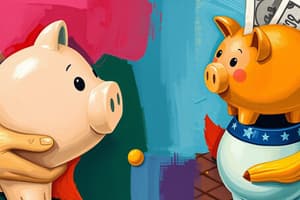Podcast
Questions and Answers
Flashcards
What is a budget?
What is a budget?
A plan that outlines how you will spend your money. It helps track your income and expenses and ensures you have enough money for your needs and wants.
What is a need?
What is a need?
Items essential for survival, like food, shelter, and clothing.
What is a want?
What is a want?
Items that are not essential for survival but make life more comfortable or enjoyable, like entertainment, travel, and luxury items.
What is saving money?
What is saving money?
Signup and view all the flashcards
What is investing money?
What is investing money?
Signup and view all the flashcards
What is donating money?
What is donating money?
Signup and view all the flashcards
What are short-term financial goals?
What are short-term financial goals?
Signup and view all the flashcards
What are long-term financial goals?
What are long-term financial goals?
Signup and view all the flashcards
Cash
Cash
Signup and view all the flashcards
Debit Card
Debit Card
Signup and view all the flashcards
Credit Card
Credit Card
Signup and view all the flashcards
E-Transfer
E-Transfer
Signup and view all the flashcards
Cheque
Cheque
Signup and view all the flashcards
Budget
Budget
Signup and view all the flashcards
Needs
Needs
Signup and view all the flashcards
Wants
Wants
Signup and view all the flashcards
What is a cheque?
What is a cheque?
Signup and view all the flashcards
What is cash?
What is cash?
Signup and view all the flashcards
What is investing?
What is investing?
Signup and view all the flashcards
What is a budget and why is it important?
What is a budget and why is it important?
Signup and view all the flashcards
What are wants?
What are wants?
Signup and view all the flashcards
What is a debit card?
What is a debit card?
Signup and view all the flashcards
Study Notes
Payment Methods
- Various payment methods exist: cash, debit cards, credit cards, e-transfers, cheques.
- Cash: Advantages include convenience, no fees; disadvantages include risk of loss, not easily tracked. Best for small, in-person transactions.
- Debit Cards: Advantages include immediate payment, linked to bank accounts, often no fees; disadvantages include potential overspending. Best for everyday purchases.
- Credit Cards: Advantages include building credit, purchase protection, rewards; disadvantages include accumulating debt, interest charges. Best used responsibly and paid off promptly.
- E-transfers: Advantages include speed, convenience, tracking; disadvantages include security concerns. Best for online purchases or sending money.
- Cheques: Advantages include detailed record-keeping; disadvantages include slower transaction times, additional paperwork. Best for formal transactions or when tracing payments is crucial.
- Different payment methods have varying fees. Research is necessary to compare these fees, and students should learn to determine the most appropriate payment method for specific situations.
Spending Money
- Needs vs. Wants: Differentiate essential items (needs) from desired items (wants).
- Budgets: A budget is a plan for managing income and expenses. It helps avoid overspending.
- Youth Income Sources: Allowance, chores, gifts are common sources of income.
- Impulse Buying: Purchasing without careful consideration. Avoid spending money you can't afford without considering potential consequences.
- Budget Basics: Creating a simple budget involves listing income and expenses.
- Categorizing Purchases: Distinguishing between needs and wants in purchases, contributing to better money management strategies.
- Budget-Conscious Shopping: Making intelligent choices while adhering to a spending plan.
- Impulse Regret: Recognizing negative consequences of impulsive purchases. Example: buying things that quickly lose appeal.
- Create a simple budget for a given amount of money.
- Analyze a list of items and categorize them as needs or wants.
- Role-play a shopping scenario and make decisions about spending based on a budget.
- Evaluate the consequences of impulse buying decisions.
- Connect spending decisions to real-world Grade 6 experiences and encourage critical thinking when faced with financial choices. Collaboration is encouraged through group discussions and activities.
Saving Money
- Saving Goals: Saving for short-term and long-term goals. Prioritizing both types of goals is crucial for financial stability.
- Savings Options: Piggy banks, savings accounts, and other options exist.
- Interest Rates: Understanding how interest earned can increase savings.
- Saving Strategy: Create a concrete plan with specific goals and timelines.
- Comparing Savings Accounts: Research different interest rates to choose the best option.
- Time Value of Savings: Calculating how long it takes to reach a savings goal at the chosen interest rate.
- Set a realistic savings goal and create a plan to achieve it.
- Research and compare interest rates offered by different savings accounts.
- Calculate how long it will take to save a certain amount of money at a given savings rate.
- Connect savings strategies to real-world students’ experiences and encourage critical thinking in making practical choices.
Investing Money
- Investment Concepts: Understanding investment as a means to enhance future returns.
- Investment Types: Stocks, bonds, and mutual funds are investments with different risk/reward levels.
- Investment Risks & Rewards: High-risk investments potentially yield higher returns but also carry substantial loss potential.
- Investment Research: Researching investment options, evaluating their risks, and understanding potential rewards.
- Research and compare different investment options.
- Analyze simple investment scenarios and identify potential risks and rewards, applying critical thinking to investment decisions.
- Discuss the importance of researching and understanding investments before making decisions, relating investments to real-world contexts.
Donating Money
- Charitable Giving: Supporting charities.
- Types of Charities: Many different organizations exist that can benefit from donations.
- Community Impact: Understanding the positive impact of charitable donations.
- Choosing a Charity: Researching charities to understand how funds are used and their missions.
- Fundraising: Planning an event to raise funds for a charity, empowering students to engage in charitable ventures.
- Ethical Considerations: Be ethical and support a cause you care about, fostering responsible choices in donations.
- Research and choose a charitable organization to support, analyzing the potential impact of charitable giving.
- Plan a fundraising activity to support a chosen charity.
- Discuss the ethical considerations related to charitable giving.
Financial Goals
- Short-Term and Long-Term Goals: Prioritize short-term goals alongside long-term aspirations, creating balanced financial planning.
- Financial Planning: Creating a step-by-step plan to achieve financial goals.
- Progress Evaluation: Assessing progress toward financial goals.
- Goal Adjustment: Modifying your plan in case of unexpected circumstances.
- Set a realistic short-term and long-term financial goal, considering both near-term and future needs.
- Create a step-by-step plan to achieve a chosen financial goal.
- Evaluate the progress toward a set financial goal and make adjustments as needed, applying critical thinking to financial choices.
Studying That Suits You
Use AI to generate personalized quizzes and flashcards to suit your learning preferences.




